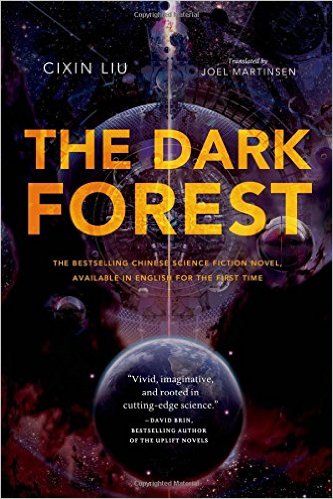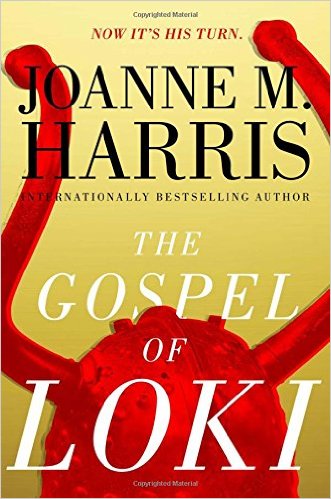Weird Kitties Reviews, Batch Five (The Dark Forest, Ghost Champagne, The Gospel of Loki)
 The Dark Forest by Cixin Liu
The Dark Forest by Cixin LiuEligible for Best Novel and available for purchase here.
I had some reservations about The Three-Body Problem, although they’re as much sour grapes as genuine objections, and its merits were considerable. This, I think, is a stronger novel, and a strong candidate for my ballot. Liu constructs an interesting conceptual structure; an alien fleet is 450 years away from Earth and bent on destroying it. A MacGuffin exists whereby Earth is under constant and total surveilance by the aliens and unable to produce any scientific advancements in theoretical physics, thus more or less locking technology more or less into variations of what’s on contemporary Earth (with a few exceptions when it furthers the plot such as cryonics).
The novel follows a couple of cunning plans unfolding over about 250 years of future history, the main one of which also unfolds along a novel explanation of the Fermi paradox that doubles as a theory of interstellar relations. This is not to say it’s a theory original to Liu - I’ve no idea there – but it’s not one that’s been overdone in stories about aliens. And that’s the basic and real appeal of this, I think. Throughout it, there’s just a genuine feeling of innovation. There’s a fresh feeling to even the hoariest of old sci-fi tropes here. It feels fresh like one imagines Asimov and Clarke did in their days. One suspects – though it’s outside my area of expertise to conclude – that a fair part of this is that we haven’t really seen a Chinese perspective on these genre conventions before, but whatever the reason, it works well.
The book’s heftier than it’s predecessor, and probably doesn’t work well if you haven’t read it, but it’s a solid and interesting science fiction novel in the grand and classical sense, which is a nice thing to see. It never drags in its length, and Liu comes up with a fresh idea often enough to keep things moving. I ended up wolfing the bulk of it down in a nice autumn evening under the blankets with a few pots fof tea and absolutely loving it, and can’t wait for the last book of the set in January.
 The Gospel of Loki, by Joanne M. Harris
The Gospel of Loki, by Joanne M. HarrisEligible for Best Novel and available for purchase here.
This novel is presented as a first person narration by the Norse trickster god Loki of his own history; from when he became blood brother to Odin, through various adventures recounted in Norse mythology, up to his actions in helping to bring about the fall of Asgard. And (spoilers) just slightly beyond.
I found this to be an entertaining read, but not much more. I moved through it at a reasonably quick pace and wasn’t inclined to put it down to come back to later as I have with other texts, but I doubt I would go back and re-read it. The individual episodes were recounted in modern idiom and at a snappy pace, and while each one was an interesting incident in its own right, they also built on the theme of Loki’s growing resentment towards the Aesir. Examining the book on a meta-level suggests that the whole point of the narration in-universe is to tell a string of adventure yarns that entertain the audience and make them look favourably on Loki and his justification for his actions. This carries through into the out-universe choices made by Harris for her novel.
There isn’t much in the way of character development, or even of character complexity. Loki gets a fair bit of complexity, simply because he’s the narrator. In addition to his list of grievances to justify betraying Asgard we get some examples of how he’s been corrupted (supposedly deliberately by Odin) with sentimentality, plus a list of off-hand likes and dislikes, and (between the lines) a sense of how his sociopathy operates. The only other character to be given complexity is Odin, with his noble public persona of builder and defender of his empire being contrasted with his plausibly deniable underhanded schemes aimed towards the same end. It may be a function of Loki slandering them, but the rest of the characters come across as pretty one-dimensional.
Looking at a few other reviews after-the-fact I discovered that a proportion of them are upset that some of the story details were at odds with those of traditional myth: for instance, Loki being a fire demon of chaos from Pandemonium rather than one of the giants. To me this misses the point, since Loki is not only a creature of dissent but also says, explicitly in the forward, that his account should be taken with a grain of salt but that it’s at least as true of the version of history promulgated by Odin. Now, if you want to get a deeper meaning from the novel you could wonder why Loki is narrating this tale. Dissent for its own sake? A need to remind us that the civilizations of today are built on the conquests and bloodshed of the past? A desire for more revenge against the memory of the Aesir? It’s almost a pity that Harris doesn’t indulge in the trope of gods-being-powered-by-mortal-
However, all of that speculation is subordinate to the fact that this is an adventure story with Loki as its hero, rather than the other way around. If you want an adventure based on Nose myth and particularly with Loki as its focus, this should be acceptable to you.

October 5, 2015 @ 5:46 am
Hello there, just wanted to second Phil’s praise for Anders’ brilliant Ghost Champagne. If you write fiction yourself, do yourself a favour and have a good look at this story. Using the simplest, most direct means – a loose, colloquial style and a ratting psycho-supernatural breakdown/breakthrough yarn to unspool – Anders shows just what a really classy writer can do. In just over 6000 words, she’s basically written a novel. A really excellent short story can contain an entire life, a whole world, while feeling as light and bubbly as…well, a glass of champagne, obviously. As Phil notes, this story crackles along on a seriously funny streak balanced to perfection with proper heart-scorching moments of human empathy. Her characters are so real you feel their presence in scenes they’re not present in, through the implied space they occupy in the narrator’s awareness – just like in real life! Seriously, do read this story, it’s a gem. Cheers!
October 5, 2015 @ 2:55 pm
Glad you liked the review! Flattered to be mistaken for Phil, but yeah, Anders might be the best sci-fi writer working today. We should be so lucky to have someone like her in “our” genre. Can’t wait to read ‘All the Birds in the Sky’.